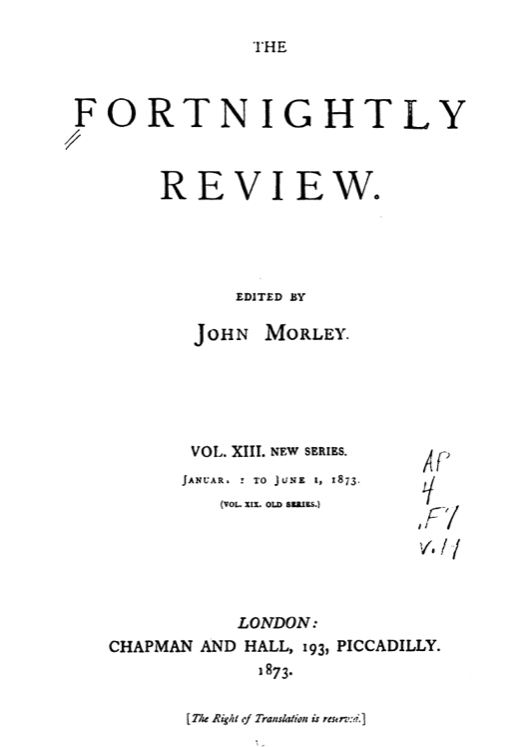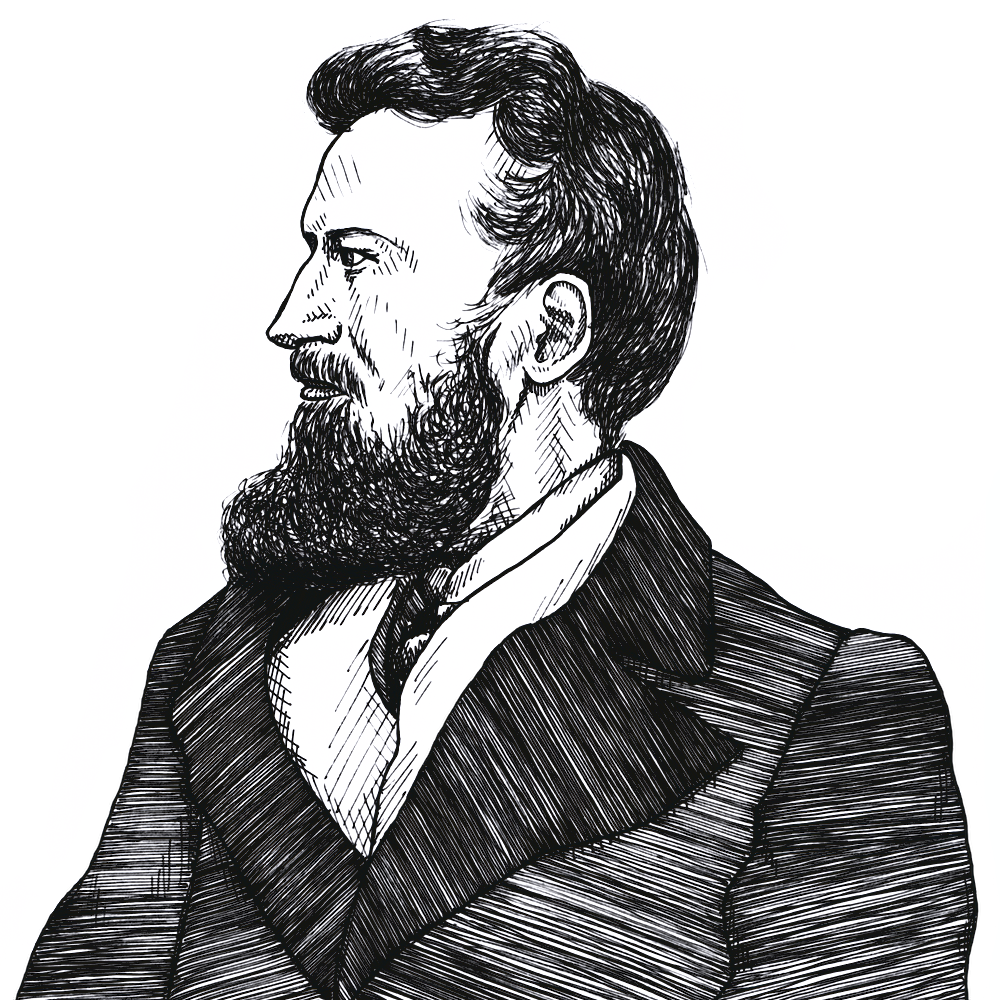An Utterly Incomplete Look at Research from 1873
This series looks at research from years past. I survey a handful of books and articles in a particular year from math, economics, philosophy, international relations, and other interesting topics. This project was inspired by my retrospective on Foreign Affairs' first issue from September 1922.
The late 1860s and early 1870s are the era of the Victorian periodical. While outlets existed for the natural sciences such as Nature and Transactions of the Royal Society, we are a few years away from widespread English-language specialized journals in philosophy, economics, and so forth. Mind debuts in 1876, the Quarterly Journal of Economics (QJE) and Political Science Quarterly (PSQ) in 1886, and the Journal of the American Statistical Association in 1888.

Our topics of interest were mostly discussed in monthly/quarterly periodicals that bound together fiction, translations, policy debate, new ideas, critique, and the occasional petty dispute. Articles during this time occupy a middle ground between journal articles written for an academic audience and essays one would find in today’s periodicals such as Harper’s or the Atlantic, though both existed at the time. These publications put the burden of context on the reader, since articles frequently feature technical discussions, respond to one another, lack sufficient references, and contain limited background material.
Several hot topics pervade the selections below. Though Darwinism was just over a decade old, evolutionary thinking grew in influence throughout the 19th century. While Darwinian evolution is often alluded to as a sort of paradigm shift, On Diversity of Evolution under one set of External Conditions refines the natural selection model and The Study of Sociology attempts to ground social science in evolutionary theory.
The recent Franco-Prussian War and the rise of the German Empire set the background for much foreign and domestic policy discussion in Western Europe. Causes of War in the Existing European Situation extensively surveys the international relations landscape. This coincided with a rise in interest in German philosophy such as Hegelianism and other post-Kantian metaphysics.
Of the bunch, I most enjoyed Walter Bagehot’s book Lombard Street and Thomas Edward Cliffe Leslie’s article Economic Science and Statistics.
Economics
Lombard Street: A Description of the Money Market by Walter Bagehot
The Meaning and Causes of Value by Albert S. Bolles
Economic Science and Statistics by Thomas Edward Cliffe Leslie
Philosophy
The Study of Sociology by Herbert Spencer
Old and New Systems of Logic by Frank Preston Stearns
On Truth and Lie in an Extra-moral Sense by Friedrich Nietzsche
A New Phase of German Thought by Léon Dumont
On the Influence of John Stuart Mill’s Writings by Edith Simcox
Math
Who Discovered the Quantification of the Predicate? by William Stanley Jevons
On the Hypotheses Which Lie at the Bases of Geometry by Bernhard Riemann
Logic of Relatives by C.S. Peirce
International Relations
Bismarckism in England by Edward Jenkins
Causes of War in the Existing European Situation by Émile Louis Victor de Laveleye
The Promotion of Scientific Research by George Gore
Other Topics
Studies in the History of the Renaissance by Walter Pater
On Diversity of Evolution under one set of External Conditions by J. T. Gulick
Liberal Education in the Nineteenth Century by William P. Atkinson
Economics
Lombard Street: A Description of the Money Market
Author: Walter Bagehot
Link: Internet Archive
Lombard Street is a street in London, not dissimilar to Wall Street, that for centuries was the epicenter of world finance. In this book, Walter Bagehot eschews the theoretical models of the political economists to offer an approachable perspective on London’s banking and finance system. Bagehot’s analysis is informed by serving the prior decade as editor-in-chief of The Economist. This book is regarded as one of the first to explain the structure of the banking system and responses to liquidity crises to a wide audience.

The discussion is anchored around the Banking Department of the Bank of England and its peculiar role as a banker’s bank. The peculiarity comes from it being a central bank (of sorts) as the government’s banker yet a private bank with shareholders and dividends. To modern eyes, it’s odd that it’s neither owned by nor has effective oversight by the government. Bagehot argues that having a single reserve bank rather than a distributed system of private banks is an historical accident; while he strongly prefers the latter, he believes we’re stuck with the former and should seek to make the best of it.
A recurrent topic is the management of liquidity crises, precipitated by the failure of the bank Overend, Gurney & Company and the ensuing panic in 1866. Such a crisis occurs when an actor in the banking system needs funds to pay an obligation but there are no funds available to borrow, leading to possible cascading defaults. Bagehot argues the one reserve bank structure causes financial crises by incentivizing banks in the middle to carry more risk. When liquidity crises do occur, Bagehot advises firms to continue borrowing/lending normally as much as possible to attempt to ride out the panic.
The Meaning and Causes of Value
Author: Albert S. Bolles
Publication: North American Review
Link: JSTOR
This paper offers an informal and intuitive statement of a subjective theory of value in economics. In particular, the author seeks to distinguish the notion of value as based on subjective utility from the labor theory of value. On this account, a good has some utility for a person, but value only comes from the extent to which others find utility in the good. Thus, Robinson Crusoe may find much utility from his goods on the island; yet, they have no value. This account is able to explain the diamond/water paradox.
I particularly like the analogy used to explain willingness to pay/sell and revealed preference:
“There are many rocks which are unseen when the waters are high, that appear to view when the waters recede. Yet the rocks are there, whether the waters are high or low. So with our desires.”
Economic Science and Statistics
Author: Thomas Edward Cliffe Leslie
Publication: The Athenaeum
Link: Google Books
In the nineteenth century, some considered statistics to be merely the tabulation of data. Leslie argues for a more robust conception in economics that aims not only to evaluate theory but to discover relationships and economic laws.
“If statisticians have often been content to collect phenomena without heed to their laws, economists more often still have jumped to the laws without heed to the phenomena.”
Combining statistics and economics has had beneficial effects on both fields. The former has gained a clear set of claims to empirically evaluate i.e. classical economics, and the latter has their deductions checked by reality. For instance, classical economists assumed something along the lines of the law of one price for wages, which says that competition equalizes wages for comparable labor across geographic areas. However, wage data does not agree with this claim.
Leslie discusses the limitations of empirical reasoning in so far as some data is either difficult to obtain or highly suspect. For instance, private firms have a clear incentive to either withhold or embellish their profits (or rather diminish their losses).
Philosophy
The Study of Sociology
Author: Herbert Spencer
Link: Internet Archive
The Study of Sociology seeks to provide a methodological basis for an evolutionary account of social science, broadly construed. This book is divided into three parts. The first argues that the study of society can be scientific but faces challenges distinct from the natural sciences, since social scientists are embedded in the object of their studies. The second - which spans approximately half of the book - enumerates several challenges for reasoning with historical and sociological data. The final part posits that biology and psychology form the essential background for careful study of society.

As a defense of social science, this book has mixed results. On the one hand, Spencer convincingly makes the case that social science is difficult due to confounding, endogeneity, dirty/bad data, researcher biases, and so forth. On the other hand, he comes off as pessimistic as to how much positive inference is even possible by consistently advocating for Laissez-faire policies on the basis of complexity. Behind this defense is Spencer’s evolutionary model, which awkwardly muddles elements of natural selection and Lamarckian inheritance with something like longtermist-flavored utilitarianism.
An interesting note is that this book led to the creation of Popular Science magazine through a publishing dispute. The Study of Sociology was written at the insistence of Spencer’s editor Edward L. Youmans. Spencer sought for it to be released piecemeal in the Contemporary Review in Britain but could not find a suitable American outlet due to differences in standards for dating publications. At the last moment in 1872, Youmans founded The Popular Science Monthly on a shoestring budget and used Spencer’s chapters as its centerpiece.
Old and New Systems of Logic
Author: Frank Preston Stearns
Publication: Journal of Speculative Philosophy
Link: JSTOR
This article discusses the Hegelian notion of logic in Charles Carroll Everett’s The Science of Thought: A System of Logic (1869). While the old logic is the rigid and narrow stuff that produced the (in the author’s view) mess of scholastic metaphysics, the new logic is expansive, covering nearly all rigorous thought.
Everett identifies logic with the “science of thought”, which covers deduction, induction, and identification as methods of reasoning. Deduction is essentially the Aristotelian logic which makes heavy use of the syllogism. Induction is the methods of empirical science which follow from the work of Francis Bacon. Identification covers methods of classification such as classifying the species of a fish by comparing the features of a particular fish to the features of the various species.
Clearly, the Hegelians had much enthusiasm for their logic:
“The new system is indeed, compared with the old, what a living, active, thinking human being is to an Egyptian mummy. The last is an historical relic, valuable and interesting to the student; but the first is the real fact of to-day, on a mission of vital importance, and with all the great possibilities of the future before him.”
I find this discussion to not be much more than semantics. Expanding the scope of logic to be all rigorous thought doesn’t actually change the thought. The motivation seems to be to bring the formal notion of logic into alignment with the lay conception, which is something we’ve accomplished today with the field of informal logic.
On Truth and Lie in an Extra-moral Sense
Author: Friedrich Nietzsche
Original Title: Über Wahrheit und Lüge im aussermoralischen Sinne
Translated in The Portable Nietzsche (1954) edited by Walter Kaufmann

This is a short but beautifully written essay; however, I’m not sure how much it actually says. Nietzsche posits that truth is a concept born from the necessity of society. While we may think of truth in a sort of correspondence to reality (at least informally), this is a cognitive bias. Rather, what we take as truths are mere conventions. Or as Nietzsche puts it, truths are “a sum of human relations which have been enhanced, transposed, and embellished poetically and rhetorically, and which after long use seem firm, canonical, and obligatory to a people”.
A New Phase of German Thought
Author: Léon Dumont
Translated by Augustus Rodney Macdonough
Publication: Popular Science Monthly
Link: WikiSource Part I - WikiSource Part II
This is a critical review of Eduard von Hartmann’s Philosophy of the Unconscious (1869). This book sought to unite the thought of Hegel and Schopenhauer and was widely read in Germany. Hartmann argues that physical theories cannot explain all phenomena in the world and, thus, metaphysical principles are required. In particular, Hartmann claims that there is an unconscious intellect guiding phenomena.
“Darwin and Hartmann stand at the opposite poles of modern thought. To Darwin belongs the most fertile idea of the age, an idea which upsets all the ancient ways of conceiving the world, and includes the first natural explanation yet given of order, of organization, and of intelligence itself. Hartmann, on the contrary, takes us back to the ancient labyrinths of teleology”
But why should this intellect be unconscious at all? The author attributes this to a pessimism found in post-Kantian German philosophy that the world or existence or humanity is essentially evil. In this way, Hartmann, as a spiritualist and pessimist, is not forced to attribute wickedness to his creator.
On the Influence of John Stuart Mill’s Writings
Author: Edith Simcox
Publication: The Contemporary Review
Link: HathiTrust
This article reflects on the work of John Stuart Mill following his death in 1873. Simcox argues that Mill’s influence is greater than is generally thought across economics and philosophy, since he focused more on clarifying and systematizing than advancing a particular Millian programme. Moreover, Mill’s temperament and penchant for tolerance led him to consider or represent all sides of an issue - even when rhetorically unwarranted. The positions Mill did support can best be seen as expressions of freedom.
Math
Who Discovered the Quantification of the Predicate?
Author: William Stanley Jevons
Publication: The Contemporary Review
Link: Google Books
In The Study of Sociology (1873), Herbert Spencer attributed the quantification of the predicate to George Bentham and later De Morgan while recounting recent British contributions to scientific thought. As this discovery was commonly attributed to the Scottish philosopher William Hamilton, a contemporary of Bentham, a priority dispute emerged which played out in the Contemporary Review (where the chapters of Spencers’ book were published in Britain). Note that this William Hamilton is unfortunately not the William Hamilton of quaternion and Hamiltonian circuit fame.

In first-order logic, a single-variable predicate refers to a property of objects. For example, $Px$ might mean “$x$ is purple”. Predicate quantification refers to reasoning about logical formulas involving predicates that include “for all $x$” and “for some $x$” quantifiers. Sentences using quantified predicates had been studied as far back as Aristotle but had not been mathematically studied until the early nineteenth century.
This short article weighs in on the priority dispute in support of Bentham. Jevons is responding to Spencer Baynes, one of Hamilton’s former students, who is leading the charge in favor of Hamilton and had cited Jevons as taking his side. In adjudicating the case, the clear piece of evidence is that in 1833 Hamilton reviewed Bentham’s 1827 book but fails to later mention Bentham’s work later despite advancing a similar account of quantification. As far as I can tell, this dispute is still unresolved.
On the Hypotheses Which Lie at the Bases of Geometry
Author: Bernhard Riemann
Original Title: Über die Hypothesen, welche der Geometrie zugrunde liegen
Translated by William Kingdon Clifford
Publication: Nature
Link: Click here

The middle of the nineteenth century saw the emergence of non-Euclidean geometries. Thinking in two dimensions, these are spaces that are not necessarily flat such that lines in these spaces may look like curves to an outside observer. This difficult little paper introduces an approach to defining spaces where notions of length, area, angles, and so forth make sense at any given point in the space but those notions may vary smoothly from point to point. This construction generalizes Euclidean space which is flat and whose magnitude looks the same at every point. Riemann concludes by considering how to describe physical space in light of this construction.
This paper is based on a lecture given by Riemann in 1854 but only published posthumously in German in 1867 and in English in 1873. Building on prior work of Gauss, Riemann’s advisor, this paper and its subsequent program was foundational to both modern differential geometry and the mathematics of general relativity.
Description of a Notation for the Logic of Relatives, Resulting from an Amplification of the Conceptions of Boole’s Calculus of Logic
Author: Charles Sanders Peirce
Publication: Memoirs of the American Academy of Arts and Sciences
Link: JSTOR
The work of George Boole and Augustus De Morgan in the 1840s and 1850s pushed the boundaries of logic beyond its Aristotelian roots. Boole introduced an algebraic approach which allowed one to determine the validity of syllogistic arguments by arithmetic operations. De Morgan sought to generalize syllogistic patterns of valid arguments to include relations such as the predicate $Lxy$ meaning $x$ loves $y$. Incorporating relations into first-order logic greatly increases its expressivity (but, as discovered by Alonzo Church in the 1930s, also introduces undecidability).
In this paper, Peirce extends Boole’s logic of algebra approach to represent relations. While the notation is cumbersome at points, this effort is often seen as the first modern approach to quantification with variable bindings. This is an unusually long paper (62 pages) consisting mostly of derivations with some philosophical commentary throughout, which to me reads more like lecture notes than anything else. Note that this paper was written in 1870 and often attributed to that year but was not published until 1873.
International Relations
Bismarckism in England
Author: Edward Jenkins
Publication: The Contemporary Review
Link: HathiTrust
The unification of Germany in the latter half of the nineteenth century brought about a conflict between Bismarck’s nationalist government and the Catholic church over who had power to make various decisions in social institutions. This article critiques James Fitzjames Stephen’s Liberty, Equality, Fraternity (1873) which applies Bismarckian arguments to England. Stephen argues that the state ought to take priority whenever state and religion are in conflict, even for decidedly ecclesiastical issues. This view has been called the “New Liberalism” - of which there’s been several new New Liberalisms since. Jenkins fears these arguments will be popular with various groups from secularists to Anglicans to get one over on the Catholic church. In doing so, however, fundamental liberal tenets such as secular government and freedom of religious thought will be swept away.
Causes of War in the Existing European Situation
Author: Émile Louis Victor de Laveleye
Publication: The Fortnightly Review
Link: HathiTrust
This is the applied companion piece to the author’s theoretical essay On the Causes of War, and the Means of Reducing their Number from the prior year. For each of the major players in Western Europe, the author considers the prospects for war and peace and paints a vivid picture of the international relations landscape following the Franco-Prussian war in 1870.

De Laveleye’s long-form analysis is multifaceted. It is occasionally realist such as with considering the ambitions of and likely response to an expanding Germany and when arguing that Holland and Belgium should form a federation to defend against possible incursions of their neighbors. There is even a Malthusian determinism about populations quickly growing to the carrying capacity of their respective states.
The Promotion of Scientific Research
Author: George Gore
Publication: The Fortnightly Review
Link: HathiTrust
By the 1870s, England had seen one industrial revolution come and go and was in the midst of a second. Following Matthew Arnold’s criticism, Gore makes the case that England focuses on inventions and applications to the neglect of theory (although this point is strongly disputed by Herbert Spencer in The Study of Sociology). This article argues for greater public investment in basic research to fuel the invention machine, leading to increased material prosperity and stronger national security.

For the bulk of the article, Gore considers various proposals such as creating state funded research laboratories, paying professors to conduct research, and so forth. There is much veneration of the German/Prussian model which saw professors and students engaging in research and produced a flurry of material, although of varying quality such as that discussed in A New Phase of German Thought. Much like Liberal Education in the Nineteenth Century from below, many of the proposals considered here have been widely adopted in the UK and elsewhere.
Other Topics
Studies in the History of the Renaissance
Author: Walter Pater
Link: Internet Archive
This book is a collection of the author’s essays on aesthetics, broadly construed, from the 1860s and early 1870s, the vast majority of which were published in the Fortnightly Review. As a whole, these essays approach the work of Renaissance artists and thinkers through a conversation with Hellenism or at least what was then viewed as Hellenistic themes.

I found the quality of the articles to decrease on average as the book progressed, with the three best covering Aucassin and Nicolette, Pico della Mirandola, and Joachim du Bellay. Perhaps, this was partly due to fatigue from Pater’s elegant yet exhausting style of writing.
Upon publication, this book caused a stir at Oxford - where Pater was a tutor - over its short conclusion which could be read as advocating a living-in-the-moment, pleasure seeking lifestyle. Among those influenced by Pater was Oscar Wilde whose novel The Picture of Dorian Gray (1891) is the only book to my knowledge to use the word “languid” more than Pater!
The Oxford World’s Classics edition provided invaluable notes to understand Pater’s varied references. Beyond providing context, these notes illustrate how inaccurate art history was at the time - or at least Pater’s command of art history - as paintings, sculptures, and more are misattributed again and again. The introduction included in this edition overreaches a bit with its author seeing more structure in Pater’s collection than what seems to me to exist.
On Diversity of Evolution under one set of External Conditions
Author: J. T. Gulick
Publication: Journal of the Linnean Society of London, Zoology
Link: Internet Archive
This paper asks whether internal variation mechanisms drive evolution outside of adaption to external conditions. Gulick uses a sort of natural experiment by observing tree snails on O’ahu island in Hawaii. The geography of this island is such that valleys where these snails reside are partitioned by mountain ridges and are otherwise similar except that one side of the island receives more rain than the rest. The author compares difference in species by distance and observes that difference varies positively with distance and is unaffected by the change in weather from one side of the island to the other. Gulick concludes that evolution can occur even when food, climate, and enemies are stable.
Liberal Education in the Nineteenth Century
Author: William P. Atkinson
Publication: Popular Science Monthly
Link: WikiSource
Liberal education in the nineteenth century was centered around Latin and Greek grammar, arithmetic, and geometry. Atkinson characterizes this approach to education as the “grindstone theory”, where students disinterestedly pursue difficult tasks devoid of much content to cultivate both discipline and rational ways of thinking. This article argues for a reform of education that is available to all, based on the vernacular, and includes the arts and sciences.

I found this article interesting and engaging but overoptimistic on what a system of education can accomplish. Atkinson’s ideas are reminiscent of Paul Lockhart’s A Mathematician’s Lament (2002) inasmuch as he wants students to engage creatively with the material rather than perform rote exercise. Thankfully, much of the system that the author envisions has come to pass.
 Buy me a coffee
Buy me a coffee
